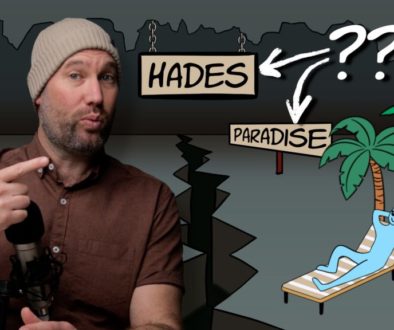Let’s Get Metaphysical, Metaphysical
For this post, I’m going to take a brief pause from discussing the biblical Story directly and get a bit philosophical for a moment. I want to take a look at how we Christians think about our faith, which in turn effects how we interpret the Story. In particular, our strong tendency to think of things in a predominantly metaphysical way.
There’s a lot to cover, and it gets a bit “brainy”, so I’ll divide it over two posts.
But first, let’s take a trip back to the Golden Age of cartoons, the 1980’s.
One of the coolest toys I ever owned as a kid was Voltron, the star character of an animated TV show in the 1980’s. Voltron is a giant alien warrior robot made up of 5 other independent robots. These other robots are machine lions that are piloted by humans, and they’re pretty cool by themselves. But when they’re seperate, they’re just robot lions. It’s only when they came together into one, fully connected mega-robot that Voltron exists.
Honestly, I don’t know why they don’t just stay together as Voltron all the time. He’s a total badass and there’s no real reason to separate him into parts. Gotta have a climax for each episode I guess.

Another example from a similar era, but way less cool, is the character of Captain Planet. In the show Captain Planet and the Planeteers there are 5 human characters each with magically powered rings: earth, fire, wind, water and heart (even as a kid I thought having the power of “heart” was a bit lame). When they combined the power of their rings together it would form the super powerful being called Captain Planet, who had all of their individual powers but even stronger. He would shout his catchphrase, “With your powers combined, I am Captain Planet!” and then save the day. Then he would disintegrate into the 5 rings again, until he was formed anew at the crisis point of the next episode.
Again, why didn’t they ditch the kids with rings and just keep Captain Planet around permanently? He’s literally more powerful than all of them combined.
Integrated Beings
Voltron and Captain Planet are great (although, of course, fictional) examples of integrated beings (integrated meaning made up of different parts that come together as a unified whole). They literally only exist when all of their parts are joined together. When their parts come apart they dis-integrate. When the 5 robot lions are running around as individual robot lions, Voltron doesn’t exist. When the Planeteers are working the power of their rings individually, Captain Planet doesn’t exist.
Pretty much everything that exists is an integrated unit. From subatomic particles right through to the expanse of the universe as a whole. If you break anything apart into its individual components, that thing ceases to exist. If you break a water molecule up into two individual hydrogen atoms and one oxygen atom, you no longer have water, you just have some atoms. If you divide a house up into a collection of separate building materials, you no longer have a house.
What I’m talking about here is the nature of existence. The point I want to make is this: that most things only really exist as an integrated whole unit, as the sum of all their parts.
Which leads on to the discussion of metaphysics. Because metaphysics, in essence, is the philosophy of the nature of existence and reality.
The Influence Of Greek Philosophy
Metaphysics, and Western philosophy in general, became established around the 5th Century BC with the fathers of Greek philosophy – Socrates, Plato and Aristotle. Plato was the student of Socrates and Aristotle was the student of Plato. I’m sure you’ve heard of them. These guys have had a massive influence on Western civilisation, including Christianity, for the last two and a half millennia.
Some quick history:
Philosophy in the last few centuries of the BC’s became a central part of Greek culture. Thanks to the conquest of Alexander the Great (who was personally tutored by Aristotle), Greek culture, including philosophy, embedded itself throughout the whole Greek Empire. When the Romans took over in the late BC’s they loved a lot of the established Greek culture and kept it, which is why it is often called Greco-Roman culture.
Then when Christianity became the official religion of the Roman Empire in the 4th Century AD, Greco-Roman culture and Christianity kind of joined together, with Greek philosophy embedded in both and remaining in Christianity ever since. Some of the most influential early Christian theologians were philosophers before converting, and they merged philosophy and theology together.
Most notable is Augustine, who was around in the 4th Century AD and is still considered one of the most influential figures in all of Christian history. He was heavily influenced by Plato (or more specifically Neoplatonism, which was a later branch of philosophy adapted from the ideas of Plato). He popularised ideas like the doctrine of Original Sin (that humans are all born in sin) and the concept of God being outside of time.
For the next thousand years or so, as Christianity spread to Europe and beyond, Greek philosophy remained heavily embedded in the development of both Western culture and Christian theology, and still influences a lot of Christian thought to this day.
Phew! How’s your brain going so far? This post is very head heavy, I know. But stick with me, it’ll be worth it.
Metaphysics – The Road To Dis-integration
Alright, back to the fathers of modern philosophy.
A main branch of philosophy that began with Plato and Aristotle and is still prominent today is metaphysics. Ideas about metaphysics have changed over time, but some of Plato’s ideas in particular have adapted and woven their way quite heavily into Christian thought.
Metaphysics, as I said earlier, is essentially ideas about the nature of existence. More specifically, the existence of immaterial or non-physical things. It’s important to make a distinction here between spiritual and metaphysical. Spiritual things have to do with, well, spirits and the spiritual realm. Metaphysics has to do with things that are more conceptual. Things that we would say are real, but not physical. Like time. Or identity. Or personality.
Plato’s central idea about reality was that there is a more real reality than the physical realm, and most of what we see and experience is just a shadow of this other reality. But he’s not talking about the spiritual realm, he means something else.
For example, the colour red. Plato theorised that there exists, outside of time and space, an ultimate ideal Red. Everything we see that looks red is just borrowing its “redness” from the ultimate Red. You can insert pretty much anything other than “red” into those last 2 sentences and you’ve got Plato’s Theory Of Forms.
Sound confusing? Let’s use one of his real examples.
In one of his writings Plato talks about beauty. He says that most people can only conceive of beauty by seeing something beautiful. But, he says, the enlightened philosopher can go beyond that and know “Beautiful” all by itself, unattached to any object. “Beautiful” doesn’t need to express itself in anything tangible, it exists all on its own.
What he’s doing is taking an abstract concept, beauty, and giving it it’s own reality. Not only that, he’s saying that the ultimate Beautiful is more real than anything we would describe as being beautiful in the physical realm.
There are two main ideas that I want to point out in Plato’s metaphysics. Even though philosophy and metaphysics have evolved and changed over time, these two ways of thinking have wound their way into theology and subtly flavoured the development of Christian thought:
- He gives abstract concepts their own disembodied reality. I.e. Beautiful is real by itself, without being attached to any object.
- He says that this other disembodied reality is more real than the reality we live in.
The Disintegration Of Love
Let me give a quick example of how an overly philosophical view of reality has effected our thinking up to the present.
Let’s talk about love.
When you think of love, what do you think about? As Christians, we’ve (hopefully) been trained to think of love as being embodied and active. But I think a lot of our modern world, without consciously thinking about it, views love primarily as some sort of cosmic, disembodied entity. A concept that is real all on it’s own. Something separate to us, that comes along and influences us… and then later can decide to leave.
That’s why we can talk about falling in love, and also falling out of love. When people break up a relationship by saying, “I’m sorry, I just don’t love you anymore,” they’re not saying, “I’m sorry, I haven’t continued to deliberately orient and cultivate my thoughts, feelings and actions towards you in a loving way.” No, they’re really saying, “The disembodied metaphysical entity called Love has stopped influencing me in this relationship. I have no control over it, it has it’s own reality. It happens. Time to move on.”
But love has no reality as just an abstract concept. It is only real as the sum of all it’s parts, as an integrated whole. It is only as real as the extent to which it is lived out and expressed in tangible ways. Love only exists when it is grounded and embodied in not just feelings, but also actions and choices.
The End Of Part 1…
Ok, if you made it through this far, well done!! Hopefully your head isn’t hurting too much. Next post, Part 2, I’ll use some different language to make this all more easily understandable, and get into just how, in my opinion, these philosophical ideas rooted in Platonism have contaminated Christian thinking.



June 7, 2023 @ 10:49 am
This is good information, not sure it would go down to well on most Sundays but still “Good work”
Thanks
Peter in Cobram Victoria